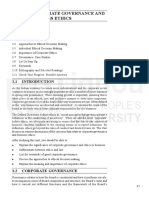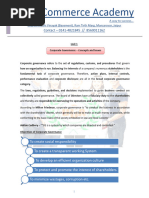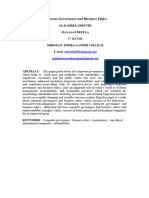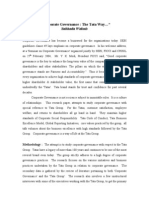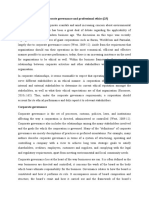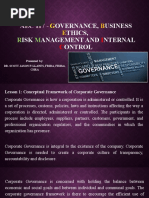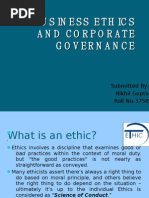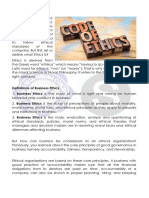Corporate Governance and Business Ethics
Corporate Governance and Business Ethics
Uploaded by
atulyash1Copyright:
Available Formats
Corporate Governance and Business Ethics
Corporate Governance and Business Ethics
Uploaded by
atulyash1Copyright
Available Formats
Share this document
Did you find this document useful?
Is this content inappropriate?
Copyright:
Available Formats
Corporate Governance and Business Ethics
Corporate Governance and Business Ethics
Uploaded by
atulyash1Copyright:
Available Formats
International Journal of Management and Social Sciences Research (IJMSSR) ISSN: 2319-4421 150
Volume 2, No. 8, August 2013
Corporate Governance and Business Ethics
Vinny Mittal, Asstt. Professor, Deptt. Of Commerce, D.A.V. (P.G.) College, Karnal, India
Vivek Gupta, Asstt. Professor, Deptt. of Commerce, Arya P.G. College, Panipat,India
Aastha Gupta, Asstt. Professor, Deptt. of Commerce, Arya Kanya Mahavidyalya, Shahabad, India
ABSTRACT Governance leads to better company performance, high
profitability and efficiency. A wider definition takes into
Corporate Governance is the system by which companies account all the company‘s stakeholders and corporate
are directed and controlled. Boards of directors are social responsibility.
responsible for the governance of their companies. The
shareholders' role in governance is to appoint the Thus Corporate Governance comprises the legal
directors and the auditors and to satisfy themselves that an infrastructure organising business (corporate law,
appropriate governance structure is in place. Ethics is the securities law, accounting rules), business ethics and the
theory or system of moral values. It is the rules or overall business environment. Corporate Governance is a
standards governing the conduct of a person, organisation part of the institutional infrastructure (laws, regulations,
or company. Hence, business ethics is the study of moral institutions and enforcement mechanisms) underlying
right and wrong as they apply to business organisations, sound economic performance. Evidence and experience
institutions and behaviours. Business ethics and corporate demonstrate that cross-country differences in laws &
governance of an organization go hand in hand. In fact, enforcement affect ownership structure, dividend payouts,
an organization that follows ethical practices in all its availability & cost of external finance and market
activities will follow best corporate governance practices valuations.
as well. An ethical organization can be recognized on the
basis of its corporate excellence and its relationship Good Corporate Governance is a key to Growing Profits
among stakeholders that is used to determine and control and Reputation. It represents the relationship among
the strategic direction and performance of organisations. stakeholders that is used to determine and control the
Corporate governance involves a set of rules that leads to strategic direction and performance of organisations.
better company performance, high profitability and Accountability is a key element as well as requirement for
efficiency. Good Corporate Governance is a key to corporate governance, fortifying the latter in such a way
Growing Profits and Reputation. The present paper speaks that it provides a transparent template for governing
about the significance of the Corporate Governance and critical decisions, procedures, and activities.
Business Ethics in corporate functional areas.
The first report on Corporate Governance was on the
financial aspects of corporate governance in UK, produced
Keywords: by a committee chaired by Sir Adrian Cadbury (1992) set
Corporate, Governance, Business, Ethics, Consumer up in response to various company collapses. The report‘s
proposals and its code of best practice emphasized the
INTRODUCTION importance of independent non-executive directors.
Independence was defined as independent from
Corporate Governance has been practised for as long as management and free from any business or other
there have been corporate entities. Yet the study of the relationship which could materially interfere with the
subject is less than half a century old. Indeed, the phrase exercise of independent judgment, apart from their fees
‗Corporate Governance‘ was scarcely used until the and share-holding. An Australian committee on Corporate
1980‘s. Corporate Governance is about the exercise of Governance (1993), chaired by Prof. Fred Hilmer of the
power over corporate entities. Every organisation, as it Australian Graduate school of Management viewed that
grows has many stakeholders like shareholders, the Board‘s key role is to ensure that corporate governance
employees, customers, vendors, community, etc. For is continuously and effectively striving for above average
survival and growth, it has to rely upon healthy relations performance, taking account of risk. Greenbury (1995)
with all these stakeholders. Hence organisations need to recommended full disclosure, a code of best practice and
provide not only good returns to shareholders but also particularly the use of remuneration committees composed
good jobs to employees, reliable products to consumers, of independent outside directors to advise on director
responsible relations with the community and a clean remuneration issues.
environment. In narrow sense Corporate Governance is
viewed as a source of shareholder value as good Corporate
i-Xplore International Research Journal Consortium www.irjcjournals.org
International Journal of Management and Social Sciences Research (IJMSSR) ISSN: 2319-4421 151
Volume 2, No. 8, August 2013
Corporate governance is concerned with the ownership, SIGNIFICANCE OF CORPORATE
control and accountability of companies, and how the GOVERNANCE AND BUSINESS ETHICS
corporate pursuit of economic objectives relates to a
number of wider ethical and societal considerations. It is
the application of best management practices, compliance There are a number of reasons why businesses should act
of law in true letter and spirit and adherence to ethical ethically. Ethical implications must be weighed before
standards for effective management and distribution of acting. As behaviour is based on values priorities, a mutual
wealth and discharge of social responsibility for effort at all levels to deal with corporate ethics begins with
sustainable development of all stakeholders. a clear understanding of core values, both individually and
Good corporate governance begins with a
organisationally.
Ethics is a Science of Morality. It deals with what is good
and what is bad. Business Ethics (also known as Corporate company's own internal practices and policies.
Ethics) is a form of applied ethics or professional ethics While corporate governance issues are common
that examines ethical principles and moral or ethical across organisations, each company requires
problems that arise in a business environment. It applies to governance principles that are unique in their
all aspects of business conduct and is relevant to the approach. Good governance is, ultimately, the sine
Corporate governance ensures that long term
conduct of individuals and entire organisations. Ethics qua non for continued growth and prosperity.
involve learning what is right or wrong, and then doing the
right thing -- but "the right thing" is not nearly as strategic objectives and plans are established and
straightforward. that the proper management structure is in place.
Companies that provide good governance, both in
Business ethics has both normative and descriptive terms of practices and results can expect the
Corporate Governance represents the moral
dimensions. As a corporate practice and a career backing not only of investors but of customers too.
specialization, the field is primarily normative. Academics
attempting to understand business behaviour employ framework, the ethical framework and the value
descriptive methods. The range and quantity of business framework under which an enterprise takes
ethical issues reflect the interaction of profit-maximizing decisions. Business decisions have an ethical
behaviour with non-economic concerns. Interest in component. In the long run ethical behaviour has a
It provides people with the tools for dealing with
business ethics accelerated dramatically during the 1980s positive impact on the company's performance.
and 1990s, both within major corporations and within
academia. For example, today most major corporations moral complexity in business. Consumers are,
promote their commitment to non-economic values under arguably, more likely to buy from a company which
headings such as ethics codes and social responsibility can be seen to be acting ethically. Also they are
charters. more likely to be attracted towards companies
which treat their employees fairly and give
THREE LEVELS OF BUSINESS ETHICS customers a fair deal. Ethical business practice is a
means of avoiding legislation and stringent
government regulations. Business ethics requires
Business ethics can broadly be classified into following
companies to contribute towards a just and fair
The Macro level: At macro level the role of
three categories.
society and also ensuring that environmental
pollution is brought under control. Businesses need
business in the national and the international to retain the vast amount of social power entrusted
organisation of society, the relative virtues of to them by the public.
different political/social systems, such as free
enterprise, centrally planned economies etc.,
international relationships and the role of business
SIGNS OF GOOD CORPORATE
on an international scale are some of the ethical GOVERNANCE
The Corporate
issues.
level: Corporate Social Sustainability Reporting: The regularity and
Responsibility (CSR) is a major ethical issue faced degree of transparency in a company‘s
by individual corporate entities (private and public sustainability reports is a key barometer of its
sector) while formulating and implementing governance standards. Therefore, annually
The Individual level: The behaviour and actions of
strategies. published reports, with audited and independently
verified data, is considered a corporate governance
individuals within the organizations is yet another best practice.
important ethical issue. Board Diversity: For years, board diversity is
regarded as a critical governance goal. A
i-Xplore International Research Journal Consortium www.irjcjournals.org
International Journal of Management and Social Sciences Research (IJMSSR) ISSN: 2319-4421 152
Volume 2, No. 8, August 2013
company‘s board membership should broadly of conduct and provide ethics training,
reflect its customer base and employees. The help employees recognise and reason
availability of viewpoints, skills, background and through ethical problems. Similarly,
experience provided by boards whose members companies with strong ethical practices
have diverse backgrounds, gives the company a set a good example for employees to
broader foundation for strategic decision-making— follow. On the other hand, companies
especially in today‘s highly competitive and global that commit unethical acts in course of
marketplace. Studies have shown that women still doing business open the door for
hold just nearly 20% of the corporate board of employees to follow suit.
director seats, yet comprise nearly 50% of the
workforce.
ETHICAL ISSUES IN CORPORATE
Executive Compensation: Giving out excessive
payments to executives at the expense of other FUNCTIONAL AREAS
employees is in direct contrast to 3hareholders‘
interests and often increases employee turnover. Ethics and Human Resource Management
Since the onset of the financial crisis, reports of Human resource management occupies the sphere of
multi-million dollar compensation and severance activity of recruitment, selection, orientation, performance
packages received for executives of companies that appraisal, training and development, industrial relations
have suffered losses, foreclosed on homeowners, or and health and safety issues. Business Ethicists differ in
laid off employees have sparked a public outcry. their orientation towards labour ethics.
Excessive executive compensation during a period Issues including employment itself, privacy and
of lackluster business performance may be an early compensation in accord with comparable worth, collective
indication of bigger trouble at a company. Poorly bargaining (and/or its opposite) can be seen either as
designed compensation programs that encourage inalienable rights or as negotiable. Following
executives to manage for short-term performance— discrimination by age (preferring the young or the old),
at the expense of long-term profitability—are gender, race, religion, disability, weight and attractiveness
another concern, potentially compromising the is an unethical business practice. The attitude of a business
governance goals of a corporation. Senior towards its employee‘s acts is a litmus test for its ethical
management‘s risks and rewards to should be character. The relationship between the business and its
aligned with those of employees, shareholders and employees is based on the employment contract. An
the long-term performance of the corporation. ethical organisation follows the principle of ethical
selection for hiring prospective employees. According to
FACTORS INFLUENCING BUSINESS ETHICS this principle an organisation should hire a person who is
Factor Influence on Business Ethics expected to contribute the maximum towards enhancing
Cultural Culture refers to the customs, long-term owner value. According to the principle of
Differences traditions, beliefs and values that are ethical selection factors like age, gender, religion and
shared and transmitted from one nationality are irrelevant for hiring a person. Ethical
generation to another. The extent of remuneration rewards only those acts of an employee that
ethical behaviour is therefore a contribute to long-term owner value.
function of the culture of a particular Trade unions
country. Unions for example, may push employers to establish due
Knowledge Greater knowledge increases the process for workers, but may also cost jobs by demanding
chance of making the right decision. unsustainable compensation and work rules. Unionized
Business decisions not based on facts workplaces may confront union busting and strike
or a clear understanding of the breaking and face the ethical implications of work rules
consequences could harm employees, that advantage some workers over others.
customers, the company, and other Management strategy
stakeholders. An employee or manager Management strategies that companies employ are a "soft"
is held responsible for his/her approach that regards employees as a source of creative
decisions, actions or inactions. energy and participants in workplace decision making, a
Therefore, the right questions should "hard" version explicitly focused on control and Theory Z
be asked all the time before decisions that emphasizes philosophy, culture and consensus. Some
are taken. studies claim that sustainable success requires a humanely
Organisational The foundation of an ethical business treated and satisfied workforce.
behaviour climate is ethical awareness and clear
standards of behaviour. Companies
that strongly enforce company codes
i-Xplore International Research Journal Consortium www.irjcjournals.org
International Journal of Management and Social Sciences Research (IJMSSR) ISSN: 2319-4421 153
Volume 2, No. 8, August 2013
Ethics and Production Management winning is measured in terms solely of material wealth.
This area of business ethics usually deals with the duties Within the discipline this rationality concept is never
of a company to ensure that products and production questioned and has indeed become the theory-of-the-firm.
processes do not needlessly cause harm. Since few goods Financial ethics is in this view a mathematical function of
and services can be produced and consumed with zero shareholder wealth.
risk, determining the ethical course can be problematic. In
some cases consumers demand products that harm them, Fairness in trading practices, trading conditions, financial
such as tobacco products. Production may have contracting, sales practices, consultancy services, tax
environmental impacts, including pollution, habitat payments, internal audit, external audit and executive
destruction and urban sprawl. The downstream effects of compensation also fall under the umbrella of finance and
technologies nuclear power, genetically modified food and accounting. Particular corporate ethical/legal abuses
mobile phones may not be well understood. While the include: creative accounting, earnings management,
precautionary principle may prohibit introducing new misleading financial analysis insider trading, securities
technology whose consequences are not fully understood, fraud, bribery/kickbacks and facilitation payments.
that principle would have prohibited most new technology
introduced since the industrial revolution. Product testing Business Ethics and Environment
protocols have been attacked for violating the rights of Environmental Ethics is concerned about moral basis of
both humans and animals. environmental responsibility. This concern inturn gave rise
to three approaches: Anthropocentrism approach,
Ethics and Marketing Management axiological approach and eco-centric approach. The first
Ethics in marketing deals with the principles, values and approach focuses on the utility that human beings can
ideals by which marketers (and marketing institutions) derive by protecting the environment. According to the
ought to act. Ethical marketing issues include marketing second approach it is moral responsibility of human beings
redundant or dangerous products/services transparency to protect animals. The last approach is a blend of first and
about environmental risks, transparency about product second approach, which states environment has to be
ingredients such as genetically modified organisms influenced by taking such activities, which are aimed at
possible health risks, financial risks, security risks etc., preserving environment.
respect for consumer privacy and autonomy, advertising
truthfulness and fairness in pricing & distribution. India has been severely affected by air pollution.
Marketing allegedly can influence individuals' perceptions Companies are becoming more environment conscious
of and interactions with other people, implying an ethical and are adopting green policies. Environmental friendly
responsibility to avoid distorting those perceptions and technology encourages the development and use of
interactions. technology that will reduce waste and pollution. Green
tourism is aimed at preserving the landscape. Green
Marketing ethics involve pricing practices, including community aims at transparency of environmental
illegal actions such as price fixing and legal actions activities of organisations.
including price discrimination and price skimming.
Certain promotional activities have drawn fire, including Ethical Issues in Strategic Management
greenwashing, bait and switch, shilling, viral marketing, Organisations while making strategic decisions face some
spam (electronic), pyramid schemes and multi-level ethical issues. Ethical issues such as setting vision, senior
marketing. Advertising has raised objections about attack manager's remuneration, implementing strategic change,
ads, subliminal messages, sex in advertising and marketing changes in organisation ownership and global strategic
in schools. operation question the management to what extent such
decisions are proper. In such a scenario mangers make use
Ethics and Financial Management of ethical decision model, to make a right decision. And
Fundamentally, finance is a social science discipline. It while taking decisions an organisation should know the
concerns technical issues such as the mix of debt and principles that enable an ethical approach to take strategic
equity, dividend policy, the evaluation of alternative decisions.
investment projects, options, futures, swaps and other
derivatives, portfolio diversification and many others. It is Ethical Issues in Purchase Management
often mistaken to be a discipline free from ethical burdens The purchasing function has been disregarded for a long
because issues in finance are often addressed as matters of time, but now it is being scrutinized closely because of its
law rather than ethics. interaction with suppliers and external market. Ethical
issues in purchasing may be favouritism, accepting of gifts
To be rational in finance is to be individualistic, by suppliers, disclosing confidential information etc.
materialistic and competitive. Business is a game played Purchase managers often favour suppliers who are also
by individuals, as with all games the object is to win and good customers, thus developing a mutually beneficial
i-Xplore International Research Journal Consortium www.irjcjournals.org
International Journal of Management and Social Sciences Research (IJMSSR) ISSN: 2319-4421 154
Volume 2, No. 8, August 2013
relationship. In some cases, purchasing managers Companies have now begun to integrate ethics into their
discriminate in favour of suppliers who are close to the top corporate cultures and concentrate on putting appropriate
management so that they can gain the support and corporate governance mechanisms in place.
confidence of the top officials.
REFERENCES
Ethical Issues in Accounting
Financial statements of a business concern are of great [1] Ahrens, T (2008), ―The hidden Ethics of Corporate
importance. But many times it is found that the frauds are Governance and the practical uses of Corporate
committed in financial statements. Some of the important Governance Codes: A commentary on Bhimani‖,
ethical issues in this regard may be fictitious revenues, Journal of Management and Governance, Vol. 12,
fraudulent timing revenues, concealed liabilities and No. 2, pp 149-152
revenues, improper disclosures and fraudulent asset [2] Bansal C L (2006), ―Corporate Governance – Law,
valuations. Practice and Procedures with Case Studies‖, New
There are two types of accounts; they are financial Delhi (India), Taxmann Publications.
accounts that are used to report to the shareholders the [3] Bhatia S K (2004), ―Business Ethics and Corporate
financial position of the firm and the internal management Governance: Concepts, Issues, Practices and
accounts that are essential to regulate internal business Dilemmas in shaping Ethical Culture for
activities. The transparency in disclosure of these accounts competitive advantage of Organizations‖, New
is important. Delhi (India), Deep and Deep Publication Pvt. Ltd.
[4] Cadbury, Sir Adrian (1992), The Financial Aspects
CONCLUSION of Corporate Governance: A Report of the
Committee on Corporate Governance, London: Gee
With the growing strength of consumer movements and and Co.
rising levels of awareness among stakeholders, [5] Gill, A. (2008), ―Corporate governance as social
corporations are realizing that stakeholders and consumers responsibility: A research agenda‖, Berkeley
are no longer indifferent to unethical practices like Journal of International Law, Vol. 26, No. 2, pp.
financial irregularities, tax-evasion, poor quality products 452-478.
and services, kick-backs, non-compliance with [6] Greenbury, Sir Richard (1995), Director‘s
environmental issues and hazardous working conditions. Remuneration: The Report of a Study Group,
Many Indian companies too have recognised the London: Gee and Co.
importance of integrity, transparency and open [7] Hilmer, Frederick G. (1993), Strictly Boardroom:
communications. It is believed that the goodwill resulting Improving Governance to Enhance Company
from adopting and successfully implementing a code of Performance, Melbourne: Information Australia
business ethics will, in the long run, translate into [8] Kleine A, Von Hauff M (2009), ―Sustainability-
economic gains. Sometimes ethical dilemmas may be driven implementation of Corporate Social
faced by employers or employees in the workplace. Responsibility: Application of the integrative
Dilemmas at work relate to power, authority, trust, sustainability triangle‖, Journal of Business Ethics,
secrecy, confidentiality and loyalty. Ethical dilemmas at Vol 85, pp 517-533.
the work place can be resolved either by the employer [9] Majumdar A K and Kapoor G K (2005), ―Company
(manager) or the employee. Law & Practice‖, 11th Edition, New Delhi (India),
Taxmann Publications.
Today, investors want to ensure that the companies they [10] Tricker, Bob (2010), Corporate Governance:
invest in are not only managed properly, but also have Principles, Policies and Practices, Oxford
proper corporate governance. Corporate Governance is University Press.
regarded as a control mechanism that ensures the optimum [11] www.corpgov.net
use of the human, physical and financial resources of an [12] www.companylawindia.com
enterprise. [13] www.businessstandard.com
[14] www.accessmylibrary.com
i-Xplore International Research Journal Consortium www.irjcjournals.org
You might also like
- DLL Business Ethics February 10 - 14 4rth QuarterDocument8 pagesDLL Business Ethics February 10 - 14 4rth QuarterBabylyn Imperio100% (2)
- Labor Code Vol 2 AzucenaDocument1,045 pagesLabor Code Vol 2 AzucenaShay GCNo ratings yet
- Study On Inter-Relationship Between Business Ethics and Corporate GovernanceDocument10 pagesStudy On Inter-Relationship Between Business Ethics and Corporate GovernanceNandini SinghNo ratings yet
- gjmbsv3n10 08 PDFDocument6 pagesgjmbsv3n10 08 PDFanveshNo ratings yet
- Unit 3Document14 pagesUnit 3Light YagamiNo ratings yet
- 57 - Corporate GovernanceDocument9 pages57 - Corporate GovernanceNitish GuptaNo ratings yet
- Business Ethics and MNCDocument21 pagesBusiness Ethics and MNCsanchitshah777100% (1)
- Business Ethics - Sem 4 - Notes-1Document42 pagesBusiness Ethics - Sem 4 - Notes-1mnamala561No ratings yet
- CG ChaptersDocument50 pagesCG Chaptersshyla01No ratings yet
- Role and Importance of Business EthicsDocument15 pagesRole and Importance of Business Ethicsnishija unnikrishnan100% (1)
- Business Ethics and Corporate GovernanceDocument12 pagesBusiness Ethics and Corporate GovernanceGracious Tigga100% (1)
- CG 1Document4 pagesCG 1vikasbasantani84No ratings yet
- Amity Law School: Corporate GovernanceDocument8 pagesAmity Law School: Corporate GovernancetanyaNo ratings yet
- Reward Management SystemDocument5 pagesReward Management Systemmohit pandeyNo ratings yet
- Samiksha Shelar SYBMS-Marketing Section Div - B Roll No - 151 FC Presentation Prof: Sayalee SableDocument4 pagesSamiksha Shelar SYBMS-Marketing Section Div - B Roll No - 151 FC Presentation Prof: Sayalee SableTisha SosaNo ratings yet
- Corporate Governance and Business Ethics: Prof - Vijay Singh Panwar Ms - Priyanka PagariaDocument5 pagesCorporate Governance and Business Ethics: Prof - Vijay Singh Panwar Ms - Priyanka Pagariaaamod_joshiNo ratings yet
- SSRN Id1751657Document23 pagesSSRN Id1751657Kamran LakhaniNo ratings yet
- ICCT Colleges Foundations, Inc.: Chapter 4 - ActivityDocument3 pagesICCT Colleges Foundations, Inc.: Chapter 4 - ActivityEugene AlipioNo ratings yet
- Business EthicsDocument4 pagesBusiness Ethicsbkiprop2605No ratings yet
- Unit-1 PeDocument19 pagesUnit-1 Perahulraj1152004No ratings yet
- Corporate Governance-2Document7 pagesCorporate Governance-2Saaideepaa SeetharamanNo ratings yet
- Corporate Governance (Final)Document26 pagesCorporate Governance (Final)Kunal K PanchalNo ratings yet
- Business EthicsDocument14 pagesBusiness Ethicskhairy181083No ratings yet
- Distinguish Between Corporate Governance and Professional EthicsDocument6 pagesDistinguish Between Corporate Governance and Professional EthicsDennyNo ratings yet
- Corporate Governance and Buisness Ethics - Ms Harshita Bhatia-Fbd ChapterDocument27 pagesCorporate Governance and Buisness Ethics - Ms Harshita Bhatia-Fbd ChapterAbhay DwivediNo ratings yet
- Business Ethics CH 6Document18 pagesBusiness Ethics CH 6PUTTU GURU PRASAD SENGUNTHA MUDALIARNo ratings yet
- SSRN 1751657Document23 pagesSSRN 1751657lex.dibakarNo ratings yet
- Module 5 EthicsDocument10 pagesModule 5 EthicsGodzon Seban PullattNo ratings yet
- Ethics Unit 5Document16 pagesEthics Unit 5Gokulapriyan ANo ratings yet
- Final Exams in GG&CSRDocument4 pagesFinal Exams in GG&CSRDiether ManaloNo ratings yet
- 6 GbriDocument23 pages6 Gbrichristianpaulcalicdan702No ratings yet
- Business Values and Ethics: Week 2 Lesson 1Document20 pagesBusiness Values and Ethics: Week 2 Lesson 1Karambu LinahNo ratings yet
- Corporate Governance and Business EthicsDocument20 pagesCorporate Governance and Business EthicsLebohang Mofokeng DavidNo ratings yet
- Explain The Concept of Business Ethics With Context of An Organization of Your ChoiceDocument15 pagesExplain The Concept of Business Ethics With Context of An Organization of Your ChoiceKhushi ChadhaNo ratings yet
- 9 Ijm May12Document6 pages9 Ijm May12Fitriyeni OktaviaNo ratings yet
- Ethics CSR Corporate BehaviorDocument19 pagesEthics CSR Corporate BehaviorChan MisakiNo ratings yet
- Tenets Good Corporate GovernanceDocument16 pagesTenets Good Corporate GovernanceTerrence JaskaranNo ratings yet
- Business Ethics in Ensuring Corporate GovernanceDocument16 pagesBusiness Ethics in Ensuring Corporate GovernancePankaj KhannaNo ratings yet
- The Study of The Relations Among Ethical Considerations, Family Management andDocument16 pagesThe Study of The Relations Among Ethical Considerations, Family Management andFulton Armando Quichimbo GoyaNo ratings yet
- Overnance, Usiness Thics, ISK Anagement and Nternal Ontrol: Presented By: Scott Jason P. Llanes, BADocument195 pagesOvernance, Usiness Thics, ISK Anagement and Nternal Ontrol: Presented By: Scott Jason P. Llanes, BAThea Brigette VergaraNo ratings yet
- Governance Business Ethics and Risk MNGTDocument195 pagesGovernance Business Ethics and Risk MNGTLala Bub100% (1)
- Unit-5 - ClassDocument2 pagesUnit-5 - Classarviii63No ratings yet
- Unit - IVDocument18 pagesUnit - IVRammohanreddy RajidiNo ratings yet
- Organizational CultureDocument24 pagesOrganizational Cultureyarabab683No ratings yet
- Corporate Governance Indicators and Their Effects On Firms' ValueDocument8 pagesCorporate Governance Indicators and Their Effects On Firms' ValueBella TjendriawanNo ratings yet
- Corporate Governance NotesDocument72 pagesCorporate Governance NotesRishika RichaNo ratings yet
- 36 Corporate Governance and Shareholder RightsDocument13 pages36 Corporate Governance and Shareholder RightsAani RashNo ratings yet
- Are Business Ethics and Corporate Governance Complementary To Each OtherDocument15 pagesAre Business Ethics and Corporate Governance Complementary To Each OtherKamalNo ratings yet
- Assignment - 1 2018 SpringDocument33 pagesAssignment - 1 2018 SpringNikhil AcharyaNo ratings yet
- Issues of Business Ethics in Domestic and International BusinessesDocument8 pagesIssues of Business Ethics in Domestic and International BusinessessashreekaNo ratings yet
- BLOCK E Corporate GovernanceDocument21 pagesBLOCK E Corporate GovernanceRalph YapNo ratings yet
- The Importance of Business Ethics in Business Development - Tạp Chí Giao Thông Vận TảiDocument6 pagesThe Importance of Business Ethics in Business Development - Tạp Chí Giao Thông Vận TảiTahmid JahinNo ratings yet
- Business Ethics and Corporate GovernanceDocument27 pagesBusiness Ethics and Corporate Governancecool20071No ratings yet
- Corporate Governance & Business EthicsDocument33 pagesCorporate Governance & Business Ethicsdev_neetuNo ratings yet
- What Is Business Ethics - Definition, Principles, and ImportanceDocument10 pagesWhat Is Business Ethics - Definition, Principles, and ImportanceHannahNo ratings yet
- Reaction Paper #8Document5 pagesReaction Paper #8Louelie Jean Alfornon100% (1)
- And Ethical Issues: Assignment of SocialDocument17 pagesAnd Ethical Issues: Assignment of Socialbhumika nagiNo ratings yet
- Ethics, Business, Management and Leadership 041022 - Students CopyDocument42 pagesEthics, Business, Management and Leadership 041022 - Students Copyammar.dzulkarnainNo ratings yet
- Lesson ProperDocument2 pagesLesson ProperSchoology SHSNo ratings yet
- Corporate Governance and Business Ethics: By: Reshu Prakash 100059 Sec-BDocument23 pagesCorporate Governance and Business Ethics: By: Reshu Prakash 100059 Sec-BSuraj KumarNo ratings yet
- Corporate Governance: For Sebi Grade A & Rbi Grade BDocument14 pagesCorporate Governance: For Sebi Grade A & Rbi Grade Bnitin0% (1)
- DK Essential Managers: Ethical Business: Sustainability, Commitment, Values, Transparency, EnvironmentFrom EverandDK Essential Managers: Ethical Business: Sustainability, Commitment, Values, Transparency, EnvironmentNo ratings yet
- R56 Ethics and Trust in The Investment Profession IFT NotesDocument12 pagesR56 Ethics and Trust in The Investment Profession IFT Notesmd mehmoodNo ratings yet
- Strama Reviewer Chapter 1 3Document7 pagesStrama Reviewer Chapter 1 3Mark Ladores Dela CruzNo ratings yet
- Santa Rosa Coca Cola Plant Employee Union Vs Coca Cola Bottlers PhilDocument7 pagesSanta Rosa Coca Cola Plant Employee Union Vs Coca Cola Bottlers PhilRobertNo ratings yet
- Ethics FinalsDocument1 pageEthics FinalsJessica LaguatanNo ratings yet
- 11 Business Ethics SyllabusDocument2 pages11 Business Ethics SyllabusskpnextNo ratings yet
- Collective BargainingDocument9 pagesCollective BargainingMartsu Ressan M. LadiaNo ratings yet
- Gujarat State Labour LawsDocument7 pagesGujarat State Labour LawsAkanksha RathoreNo ratings yet
- Accounting Brochure 2013Document20 pagesAccounting Brochure 2013Byron Lu MorrellNo ratings yet
- Unite MotionDocument2 pagesUnite MotionAnas KabarNo ratings yet
- A Cross-Cultural Comparison of Corporate Social Responsibility Practices - America and ChinaDocument120 pagesA Cross-Cultural Comparison of Corporate Social Responsibility Practices - America and ChinaXu LiuNo ratings yet
- RCSD Complaint Against ASARDocument6 pagesRCSD Complaint Against ASARRochester Democrat and ChronicleNo ratings yet
- Ethical Issues in IbDocument14 pagesEthical Issues in IbAanchal GuptaNo ratings yet
- Ethical BehaviourDocument24 pagesEthical BehaviourRathore NitinNo ratings yet
- Abdul - 2022026 - CSR Project On TCSDocument34 pagesAbdul - 2022026 - CSR Project On TCSAbbi ShaikhNo ratings yet
- Annexure: Employee Name: DesignationDocument3 pagesAnnexure: Employee Name: DesignationMd Shadab AlamNo ratings yet
- Dynamic Business Law The Essentials 4th Edition Kubasek Test BankDocument14 pagesDynamic Business Law The Essentials 4th Edition Kubasek Test BankCrystalPerezfszdm100% (15)
- Business Ethics/ Social Responsibility/ Environmental SustainabilityDocument27 pagesBusiness Ethics/ Social Responsibility/ Environmental SustainabilityFarid ChanchadNo ratings yet
- Indian EthosDocument5 pagesIndian EthosPrayag DasNo ratings yet
- Business EthicsDocument28 pagesBusiness EthicsPhệ Tâm Ngân LãngNo ratings yet
- Conversation - Business EthicsDocument24 pagesConversation - Business EthicsHeidi NelNo ratings yet
- SONYDocument11 pagesSONYdarshitapatel_20No ratings yet
- Labour DayDocument1 pageLabour DaySulemanNo ratings yet
- PSO Annual Report 2018 PDFDocument115 pagesPSO Annual Report 2018 PDFKInza KhanNo ratings yet
- Doc-20231123-Wa0009 231123 191422Document11 pagesDoc-20231123-Wa0009 231123 191422amanbhardawaj98No ratings yet
- Business Ethics - Part 2 - Chapter 4 RightDocument40 pagesBusiness Ethics - Part 2 - Chapter 4 RightSarah Jarrar50% (2)
- Deloitte CE Code of Conduct: It Starts With IntegrityDocument12 pagesDeloitte CE Code of Conduct: It Starts With IntegrityMadalina AndreeaNo ratings yet
- Thom21e Ch09 FinalDocument49 pagesThom21e Ch09 Finalagungwibowo89No ratings yet
- Business Ethics-Itc As A ModelDocument10 pagesBusiness Ethics-Itc As A ModelKripesh Kumar DubeyNo ratings yet




